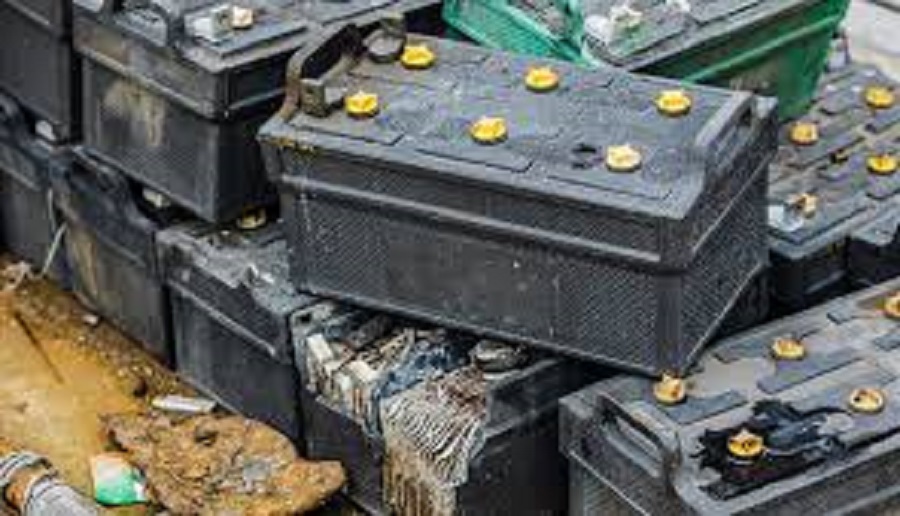News
NESREA Urges Nigerians to Dispose Batteries Properly to Avoid Hazards

National Environmental Standards and Regulations Enforcement Agency (NESREA) has urged Nigerians to dispose of used batteries responsibly to prevent environmental and health hazards.

Innocent Barikor, director-general of NESREA, stressed the need to upgrade the lead-acid battery recycling sector in Nigeria and Africa.
He told Vanguard Newspaper recently that improper disposal of batteries poses severe risks to public health and called for strict adherence to environmental regulations.
He noted that Nigeria had already introduced regulations for the battery sector and emphasized the need for enforcement.
Barikor also highlighted the importance of standardizing battery recycling regulations across Africa, stressing that non-uniform policies hinder progress.
He further noted that the recent international conference was organized to bring together stakeholders and experts from other countries to discuss solutions and best practices for improving lead-acid battery recycling in Africa.
He said, “Nigerians should simply avoid breaking batteries. There are registered collectors trained to handle used batteries. If you’re through with your battery, send it to the people who know how to collect and dispose of it properly.
“The regulation is not meant to shut down businesses but to ensure batteries are handled responsibly. More batteries will be needed due to the transition to green energy, but we must prevent lead contamination.
“Part of the challenge we have today is the lack of standardization among African countries. If regulations are uniform, companies will have no choice but to comply,” he said.
Also speaking, Dr. Leslie Adogame, executive director, Sustainable Research and Action for Environmental Development (SRADeV), called for cleaner recycling technologies in the lead-acid battery sector.
According to Adogame, a policy framework was developed following global concerns over Nigeria’s lead recycling practices, which led to increased scrutiny from international investors.
He explained that European investors buying lead from Nigeria had cut ties with some facilities due to pollution concerns, which prompted regulatory changes.
He said, “When we examined the industry, we found many sharp practices under the guise of recycling. While recycling is good, brown recycling—where pollution is not controlled—is harmful.
“You cannot put the economy above people’s health. If facilities must be shut down to protect lives, then that’s what should be done,” he stated.
On the adoption of cleaner technologies, Adogame added, “We are not promoting a particular technology, but industries must embrace best practices. If you must recycle, use equipment that does not pollute the environment.”
Meanwhile, Andreas Manhart, coordinator of the Partnership for Responsible Battery and Metal Recycling (ProBaMet), highlighted efforts to improve lead-acid battery recycling in Nigeria.
He noted that informal recycling practices contribute to severe pollution and called for sustained efforts to protect public health.
“The project has introduced improved recycling technologies, trained recyclers, and worked with government agencies to enforce stricter regulations.
“Continuous enforcement of environmental laws, investment in modern recycling facilities, and stronger collaboration between stakeholders are necessary to minimize lead contamination,” he added.
News
Aliko Dangote Signs out @ Dangote Sugar Refinery as Chairman

In a major leadership transition, Dangote Sugar Refinery Plc (DSR) has announced the retirement of Aliko Dangote, its founder and chairman, from the Board, effective June 16, 2025.

Aliko Dangote
The announcement was made in a regulatory filing with the Nigerian Exchange Ltd on June 11, highlighting the company’s commitment to sound corporate governance and structured succession planning.
In a statement signed by Mrs. Temitope Hassan (FCIS), company secretary and legal adviser, the Board praised Dangote’s extraordinary leadership and lasting contributions to the company.
“Alhaji Aliko Dangote is one of the founding Directors of the Company and has served with exceptional leadership, integrity, and vision since 2005,” the statement read.
“Under his stewardship, Dangote Sugar Refinery transformed significantly, navigated industry changes, consistently delivered value to shareholders, and upheld strong governance principles.”
Widely regarded as Africa’s most influential industrialist, Dangote led DSR’s evolution into a dominant player in Nigeria’s sugar value chain.
His strategic initiatives, particularly the Backward Integration Projects (BIPs) across Adamawa, Taraba, and Nasarawa States, advanced the company’s self-sufficiency goals and aligned with the federal government’s national sugar master plan.
While stepping down from DSR, Dangote will continue as President of Dangote Industries Limited.
His legacy at DSR is marked by industrial innovation, strategic foresight, and sustained operational excellence.
To ensure a seamless transition, the Board has appointed Mr. Arnold Ekpe, a seasoned independent non-executive director, as the new chairman, effective June 16.
Ekpe is renowned for his tenure as Group CEO of Ecobank Transnational Incorporated, where he championed pan-African financial inclusion and institutional growth.
His extensive experience in banking and corporate governance is expected to strengthen DSR’s next phase of development.
The leadership change signals continuity of vision, with DSR reaffirming its focus on operational efficiency and long-term value creation in a dynamic market.
For shareholders and industry observers, Dangote’s exit from the Board marks the end of a transformational era—one defined by bold ambition and strategic execution—while opening a new chapter under Ekpe’s leadership.
News
Report Reveals New Malware Posing as an AI Assistant Steals User Data

Kaspersky Global Research & Analysis Team researchers have discovered a new malicious campaign which is distributing a Trojan through a fake DeepSeek-R1 Large Language Model (LLM) app for PCs.

The previously unknown malware is delivered via a phishing site pretending to be the official DeepSeek homepage that is promoted via Google Ads.
The goal of the attacks is to install BrowserVenom, a malware that configures web browsers on the victim’s device to channel web traffic through the attackers servers, thus allowing to collect user data – credentials and other sensitive information. Multiple infections have been detected in Brazil, Cuba, Mexico, India, Nepal, South Africa and Egypt.
DeepSeek-R1 is one of the most popular LLMs right now, and Kaspersky has previously reported attacks with malware mimicking it to attract victims. DeepSeek can also be run offline on PCs using tools like Ollama or LM Studio, and attackers used this in their campaign.
Users were directed to a phishing site mimicking the address of the original DeepSeek platform via Google Ads, with the link showing up in the ad when a user searched for “deepseek r1”.
Once the user reached the fake DeepSeek site, a check was performed to identify the victim’s operating system. If it was Windows, the user was presented with a button to download the tools for working with the LLM offline. Other operating systems were not targeted at the time of research.
After clicking on the button and passing the CAPTCHA test, a malicious installer file was downloaded and the user was presented with options to download and install Ollama or LM Studio.
If either option was chosen, along with legitimate Ollama or LM Studio installers, malware got installed in the system bypassing Windows Defender’s protection with a special algorithm.
This procedure also required administrator privileges for the user profile on Windows; if the user profile on Windows did not have these privileges, the infection would not take place.
After the malware was installed, it configured all web browsers in the system to forcefully use a proxy controlled by the attackers, enabling them to spy on sensitive browsing data and monitor the victim’s browsing activity.
Because of its enforcing nature and malicious intent, Kaspersky researchers have dubbed this malware BrowserVenom.
“While running large language models offline offers privacy benefits and reduces reliance on cloud services, it can also come with substantial risks if proper precautions aren’t taken.
Cybercriminals are increasingly exploiting the popularity of open-source AI tools by distributing malicious packages and fake installers that can covertly install keyloggers, cryptominers, or infostealers.
These fake tools compromise a user’s sensitive data and pose a threat, particularly when users have downloaded them from unverified sources,” comments Lisandro Ubiedo, Security Researcher with Kaspersky’s Global Research & Analysis Team.
News
Court Declares Bank’s Withholding of Retirement Benefits Unlawful

National Industrial Court in Lagos has ruled that a deposit money bank must pay over N162 million in outstanding retirement benefits to a group of its former employees.

The judgment, delivered by Justice R.H. Gwandu, criticized the bank’s attempt to withhold entitlements from staff employed through third-party arrangements.
The claimants, represented by Chief Mike Ozekhome, SAN, argued that the bank violated labor laws by refusing to honor their retirement benefits. They sought declarations that the bank’s actions were unlawful and requested immediate payment of their dues.
Justice Gwandu ruled in favor of the employees, stating that the use of third-party employment to evade obligations was unacceptable.
The court acknowledged their long service and dismissed the bank’s argument that they did not meet the required 15 years of uninterrupted service.
Notably, the court upheld the rights of the 10th claimant, who continued working with the bank after its merger with Manny Bank and another commercial institution.
This landmark ruling reinforces workers’ rights and establishes that organizations cannot use outsourcing arrangements to deny employees their legitimate benefits.

 News3 days ago
News3 days agoCDCFIB Warns against Recruitment Racketeers

 Telecom3 days ago
Telecom3 days agoMeta, FMCIDE Unveil AI Accelerator to Drive Innovation in Nigeria

 News3 days ago
News3 days agoFG May Forfeits $4m from World Bank Loan over Audit Flop

 Telecom3 days ago
Telecom3 days agoNigeria Leads the Charge in Green Innovation @MTN’s Africa PachiPanda Challenge

 Broadcasting3 days ago
Broadcasting3 days agoAfia TV and Radio Stamps Footprints in Lagos

 E-Financial3 days ago
E-Financial3 days agoNDIC Begins Final Settlements to Creditors of Liquidated Premier Bank

 Telecom2 days ago
Telecom2 days agongCERT Issues High Alert to Nigerians Using Android Phones

 E-Business2 days ago
E-Business2 days agoAfrican Startups Raised $345m in Funding in May






















